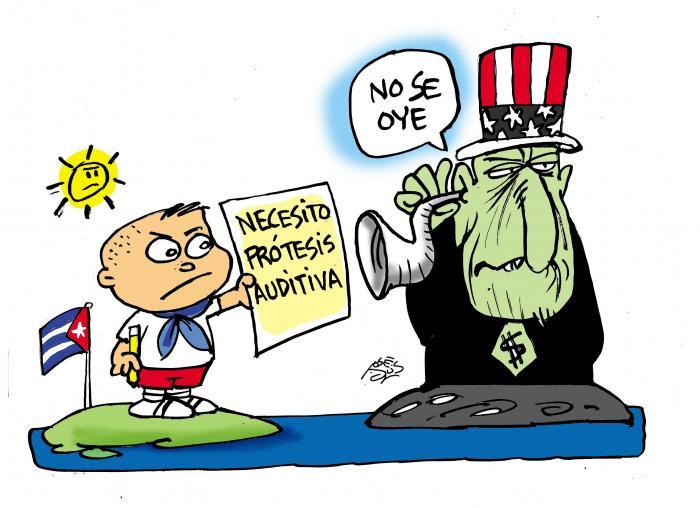
These days, a fallacious analogy of the U.S. blockade against Cuba is circulating in social networks which, as in other "theses" of the same kind, seeks to blame the victim for not being sufficiently willing, as well as to silence any possible condemnation of that monstrosity that does so much harm to the Cuban people.
With such an artifice, the blockade is compared to the limitations of a disabled person. It is claimed that this person has only two alternatives. One: to spend his life blaming the physical problem and survive with crumbs; two: to get used to his limitations and fight in such a way that one day he may even become a Paralympic champion.
Actually, the background of such an analogy is not new. For some time now, some economists, especially those who analyze the Cuban economy from media designed for hostile propaganda against our country, have wanted to present the blockade as a sort of static variable that does not generate new scenarios or change qualitatively in response to the dynamics of the system.
This is not only false, but also treacherous. If we were to establish an analogy, it would not be that of a person suffering from a disability, but that of a healthy and willing athlete who, in the middle of his career, is constantly being tripped and pushed.
Whoever pretends to insinuate that this country complains and lives begging for crumbs deserves the greatest repulse. They are mocking what is an example of tenacity and eagerness for independence without precedent in the world. No country could have resisted such an siege, for 64 years, without surrendering or disappearing.
The blockade is not something abstract, but a system of dynamic variables that not only acts in the punctual; it also acts on future decisions. In the face of any alternative to avoid suffocation, a new variable will always emerge to try to seal the vent.
More than a mistake, it would be foolish not to take this into account in plans, analyses and economic decisions. You can have a product of the highest quality and demand, but blocking it will always jeopardize financing, supply chains, and limit its market reach and price.
If the word "disability" is going to be mentioned together with the word "blockade", a minimum of decency would advise that, in the first place, the damage that this monstrosity does to many Cubans who are disabled should be denounced.
Cuba is denied the acquisition of wheelchairs, equipment for the Braille system, prostheses of different types, among other humanitarian items.
It is almost impossible to have access to different equipment created for deaf people, such as cochlear implants, baby alarms, alarm clocks and wristwatches, or luminous bells, since the most affordable ones have in their composition more than 10% of material coming from the northern country.
Does our country really justify the blockade in its eagerness to do the impossible to make life easier for this extremely vulnerable sector, especially children? Who will dare to say so?
We are accustomed to the cynicism of those who have designed a system that for more than 60 years has not only sought to starve us into submission but, as part of the strategy of generating disenchantment, has killed thousands of Cubans, including many children, with invasions, sabotage or the introduction of infectious diseases, among other terrorist practices.
They are the same ones who only three years ago did the impossible to delay the Soberana vaccine or denied medical oxygen to the patients of covid-19, at the most critical moment of the pandemic, and now they exert pressure on shipping companies and banks so that we do not receive indispensable products.
So, those who parrot their speeches, whether they do it out of ignorance, naivety, propensity to banal thinking or a sort of Stockholm syndrome, should understand that, perhaps without intending to, they are placing themselves at the same despicable level.








